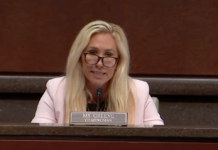
ATLANTA (GA Recorder) — Georgia’s unemployment rate has steadily improved toward pre-pandemic levels — July’s unemployment rate was 3.7%, according to the Bureau of Labor Statistics, within shouting distance of March 2020’s rate of 3.6%. Nationwide, the unemployment rate is 5.2%.
“We felt a lot of pain during the pandemic, there’s no disputing that,” said Kennesaw State University economics professor Roger Tutterow. “But we’re probably one of the states that held up a little bit better, and bounced back a little bit faster than the national average.”
“If you look at non-farm employment, at one time we were down 13%, we’re now down about 2%,” he added. “That means there’s a very good chance that Georgia will get back to pre-pandemic employment levels in 2022, and it may take a little bit longer for the nation to get there.”
But as COVID-19 hospitalizations continue to mount and unpredictable school closures make life harder for Georgia’s working parents this Labor Day, the full story of the state’s economic recovery has not yet been told, said Laura Wheeler, interim director of the public finance research cluster at Georgia State University’s Andrew Young School of Policy Studies.
“I think overall, the story is optimistic. We are getting back, but there are other stories to be told” she said. “Let’s think about who’s not reflected in these numbers. The unemployment rate is going down, and that looks great, but there are people who have dropped out from the labor force. What about them? And I think it continues to be a story about the direction of the virus. Until we get the virus under control, we’re battling with one hand tied behind our back.”
The uncounted
The recovery has not reached all Georgians equally, said Ray Khalfani, a research associate at the Georgia Budget and Policy Institute. Black Georgians are finding their way back to the workplace more slowly than their white counterparts.
“The share of Black Georgians who are unemployed and enrolled in unemployment insurance is higher than it’s been in this entire pandemic and higher than it was even in the Great Recession,” Khalfani said. “64% of the share of all Georgians receiving unemployment insurance are African American. So while we may have some pandemic lows when it comes to the unemployment rate, we’re at a pandemic high as far as the share of those Black people who are receiving jobless payments.”
In the first four months of 2021, Georgia’s overall unemployment rate was 4.8%, but among Black Georgians, that number was 7.2%, according to the Economic Policy Institute.
“That speaks to the fact that Black Georgians are having a harder time getting back into the workforce, and that’s contributed to hiring bias, discrimination bias, that could be because of other issues related to a lack of resources to be able to look for work,” Khalfani said. “When you think about Black Georgians having significantly less wealth than their white counterparts, and you’re out of the workforce, you’re looking for a job, it takes resources to be able to look for work. If you have fewer resources to rely on, it can make it even harder for you to get back to finding a job.”
Other people are struggling as well. The unemployment rate only counts people who are available for a job and have actively sought work in the past four weeks, but not so-called discouraged workers, people who want to work but who have given up on applying for jobs.
Adding in those Georgians as well as people who have taken a part-time job but want to be working full time gives Georgia a labor underutilization rate of 9.9% during the most recent BLS reporting period, which is lower than the national average of 11.9%.
Last year, 12.5% of Georgians fell into those categories, but in 2019, before the pandemic struck, it was only 6.5%.
Many of those people are working in lower-paying jobs than they were before the pandemic and struggling to make ends meet, said Ryan Richardson, program coordinator for the Atlanta-North Georgia Labor Council.
“For some folks, the pandemic hit them so hard that they’ve got to do whatever they’ve got to do to try to get by, and so they’re trying to get jobs, they’re working two or three jobs at minimum wage in Georgia,” he said.
Others are struggling over the costs of child care, which can be so high that workers in low-paying jobs break even or lose money after a day at work.
That’s always been a dilemma for working parents of young children, Wheeler said, but with COVID-19 spreading in schools and forcing the shutdown of classrooms and schoolhouses, it’s becoming a factor for more families.
“Now that school has started, we can see if that helps bring some of those individuals back into the labor market,” Wheeler said. “But we also have to see how school goes. It’s hard for a parent to take on a full-time job if they don’t have confidence that the child is actually going to stay in school if there are moves to virtual, or needing to quarantine because of outbreaks that are recurring, that’s going to cause disruptions in getting that last group of that narrow definition of labor force participation unemployment rate back into the labor force.”
A push back to work
A slate of federal unemployment programs that boosted unemployment benefits is set to expire Sept. 6 around the country, but they ended in June for Georgians. Gov. Brian Kemp and Labor Commissioner Mark Butler said cutting the program off early would help encourage workers back to their jobs as employers said they were desperate to fill vacant positions.
“I think we do need to acknowledge that a lot of the stimulus programs that were put in place nationwide did likely encourage some workers to stay out of the labor force, particularly for lower-compensated positions like you might find in hospitality, or maybe in retail sales,” Tutterow said. “There were individuals who did as well or better with the enhanced unemployment benefits as they got working, so it’s not irrational for them to be a little reluctant to come back to the workforce. Georgia is among the states truncating the enhanced unemployment benefits a little bit early, but I’m not sure that we’ve seen that in the data yet.”
The food service industry was one of the first to suffer as the first wave of COVID-19 brought gathering bans across the country.
It has also been one of the slowest to recover — though sales are on the rise, three-quarters of restaurant operators told the National Restaurant Association recruitment and retention has been their toughest challenge in a report released Tuesday.
Parts of Georgia that heavily rely on tourists have been especially vulnerable to this, Tutterow said.
“Within the state, if you think about those communities where the leisure and hospitality sector, was the most pronounced, which would be of course, downtown Atlanta, the coastal empire and some pockets in the northern Georgia mountains, those parts of the state where leisure and hospitality were a more important part of the economy certainly felt more pain last year and are probably struggling to fully regain their footing now,” Tutterow said.
Check out the restaurant windows in many of those places and you’re likely to see more than a few help wanted signs.
It pays to pay well
Many former restaurant employees have decided to seek jobs in better-paying fields, Richardson said.
“What people are realizing is that they’re risking themselves for not enough money,” he said. “And so some of the folks that are staying home are walking off the job because they’re risking their lives and they’re not being properly compensated for it. If you want workers to go to work, you’ve got to pay them well, you’ve got to treat them well, you’ve got to take care of them.”
That could end up in the favor of workers in some cases, Wheeler said.
“In industries where there is a shortage of labor, the wage earner, the worker is going to have more market power and will be able to, to extract some higher wages from the market because of that market power,” she said. “And so we’re seeing numerous examples of places offering signing bonuses, retention bonuses, benefits that weren’t offered before, in a need to attract workers.”
A Macon cook named Aaron said he’s seen that first hand.
Aaron, who did not want his last name published out of concern for retaliation at work, had no professional restaurant experience before the pandemic struck.
He started his first cooking job in May and has since moved jobs twice, getting a significant bump in pay both times.
“It certainly wasn’t hard to find a restaurant to start at,” he said. “It was a piece of cake to move to this point. I managed to move upwards in terms of responsibilities or position or wages every time, and it wasn’t a struggle.”
Aaron loves to cook at home and is handy in the kitchen, so he had an advantage. The biggest adjustment was dealing with the fast pace of a professional kitchen.
“I was able to use that to go to a nice restaurant where, like, nobody’s hair is on fire, but my ability to work fast has made me advance very quickly to where I’ll be the actual chef in a couple months. But I’ve been cooking for a long time, so it wasn’t like I came in here to learn how to cook, it was just to learn how to do it fast and professionally.”
Aaron’s restaurant is dealing with staffing issues as well. They’re trying to hire one more cook, and he’s had to pick up the slack, but for him, that’s not too big a deal.
“The money’s nice, it’s not really stressful,” he said. “It does get a bit physically tiring after a bit, but I was able to leverage that to get into a salaried position, so it’s ultimately a positive for me.”
“If you had asked me about the last restaurant that I was working at, I would have said I don’t know if I can stand this kind of environment very long,” he added. “But now that I’m in a place that’s reasonable, everyone’s a professional, yeah, I can see myself sticking around for a long time.”
A big part of that is that he feels like he is being fairly compensated for the work he is doing.
“I think in general, if you want people willing to work harder and do better quality work for you, maybe consider, you know, paying them a bit more for their labor,” he said. “This is not necessarily an easy job. It can be if you’re in a decent place and serving good food, but it’s not necessarily easy to do, especially not at a rapid pace, and some of the wages I’ve heard people being offered are pretty ridiculous.”
Khalfani said employers would do well to take that advice.
“People are returning to the leisure and hospitality industry, particularly the places that are competing, raising wages, raising benefits, those who are not, certainly need to catch up or find ways to possibly be able to raise their wages to be able to compete to get more workers in, because at the end of all this, people want to have a livable job, want to have a job that has livable pay, safe working conditions, and particularly when it comes to Georgia, we still have a ways to go.”







